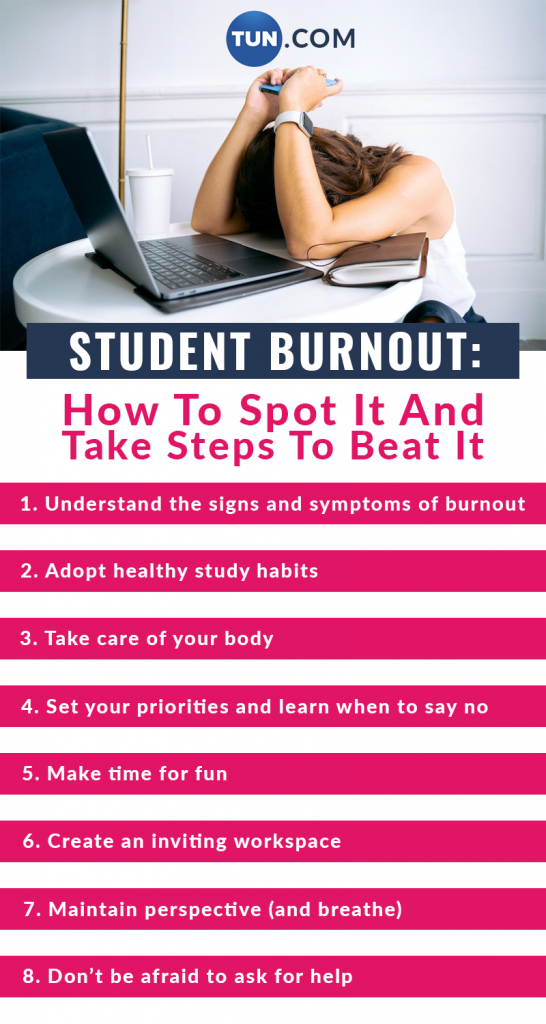Are you feeling mentally, physically, and emotionally exhausted? Do you lack the motivation to do your homework, study, or even take notes during class? If so, chances are you’re experiencing burnout, a feeling commonly caused by excessive and prolonged stress.
Burnout is no joke. It’s an emotionally deadly illness that can leave you feeling helpless, hopeless, frustrated, exhausted, and cynical. If left unmanaged, burnout can lead to significant mental health problems, including depression and insomnia, and negatively impact things like your grades and social life.
Life and school are not easy, and everyone is susceptible to burnout. For that reason, you need to learn how to spot it and take the necessary steps to fix it.
Here’s what you need to know.

Understand the signs and symptoms of burnout
Burnout is a sickness that can hit at any point in your life. Before you can work on getting better, you have to recognize its signs and symptoms.
According to the mental health nonprofit HelpGuide, there are physical, emotional, and behavioral signs and symptoms of burnout.
The physical signs and symptoms include “feeling tired and drained most of the time, frequent headaches or muscle pain, change in appetite or sleep habits, and lowered immunity and frequent illnesses.”
The emotional signs and symptoms include the “sense of failure and self-doubt, loss of motivation, feeling helpless, trapped, and defeated, feeling alone in the world, an increasingly cynical and negative outlook, and decreased satisfaction and sense of accomplishment.”
And the behavioral signs and symptoms include “withdrawing from responsibilities, isolating yourself from others, procrastinating, taking longer to get things done, using food, drugs, or alcohol to cope, and taking out your frustrations on others.” Additionally, you may find yourself skipping school or coming in late.
Adopt healthy study habits
Research suggests that working less, taking more breaks, and finding a comfortable work-life balance are effective ways to treat and prevent burnout. So instead of sprinting through your studies, cramming at the last minute, or overworking yourself, which all cause unnecessary stress, slow down and take a calculated approach.
Give yourself ample time, pace yourself, and take regular breaks. If you do that, studying and completing assignments will become much more manageable and enjoyable. Ultimately, you should do what feels comfortable. However, if you’re someone who needs structure, there are specific study methods that you can follow.
Ashley Wells, a recent graduate of the Master of Arts in Liberal Studies (MALS) program at Dartmouth University, uses the Pomodoro method, which involves studying in 25-minute increments with 10-15 minute breaks in between.
“I make sure to not study over that 25-minute increment, because I know that my attention starts to wane after that time. I also make sure to stand up and stretch for a minute or two to wake myself up and get my blood flowing,” Wells wrote in a Dartmouth blog post.
For many, including Instagram study influencer @intellectys, the key to minimizing the stress attached to studying comes through staying organized.
“Breaking all my work down into more manageable chunks that I can plan on a calendar, add to my to-do list, and then cross off makes it so much easier to tackle a task, like writing a major essay or studying for an exam, that looks daunting at first glance,” she told TUN.
Take care of your body
Positive physical health is directly linked with positive mental health. Healthy eating, sleeping, and exercise habits will keep your brain sharp and boost your mood and energy levels.
• A healthy diet
One of the biggest steps to getting and staying healthy is monitoring what you’re putting in your body.
“A healthy diet will consist of nutrient-dense whole foods, especially vegetables, and fruits,” Jill Kubala, a registered dietician and wellness expert, told TUN. “A diet that is rich in produce has been linked to not only improved memory and decreased chances of cognitive decline but also lower risk of chronic health conditions like diabetes, obesity, heart disease, Alzheimer’s disease and things like that.”
And while no foods or drinks are absolutely off-limits, there are some that you should try to do your best to avoid.
“Added sugar, in general, can really affect your brain health and cognitive functions,” said Kubala. “So, limit added sugars wherever you can.”
“Highly processed foods, including sugary breakfast cereals, fast food, and highly processed packaged food are best to avoid when possible,” she added.
• Healthy sleeping habits
If you’re noticing symptoms of burnout, one of the first and easiest things you can do is hit the hay earlier.
According to the National Sleep Foundation, the average teenager between the age of 14 and 17 should get 8-10 hours of sleep each night, and the average young adult between the age of 18 and 25 should get 7-9 hours of sleep each night. In reality, teens sleep an average of about 7 hours per night, and college students average 6-6.9 hours each night.
Additionally, the timing of that sleep matters. To develop a healthy sleeping pattern, you need to go to bed and wake up at roughly the same time every day, even on weekends.
“You can’t make up for sleep,” Kubala told TUN. “If you’re sleeping five hours five days a week, you can’t make it up by sleeping 10 hours on Saturday and Sunday.”
If getting to bed on time is a challenge, try cutting down on caffeine, avoiding blue light, developing a nighttime routine, keeping the room temperature between 60 and 67 degrees Fahrenheit, or practicing any of the other tips outlined here.
• Healthy exercise habits
Exercise has so many physical, mental, and emotional benefits, and reducing risk of burnout is one of them. You don’t need to become a marathon runner, but you should aim to exercise for at least 30 minutes a day. You could go on long walks or light jogs to start and mix in more intense workouts from there. Additionally, there are added benefits if you can work out outside in nature.
• Practice mindfulness
Practicing mindfulness is a great way to manage feelings of stress so that they don’t become consuming and lead to burnout.
“When studying is attached to grades, and those grades determine opportunities in life, it’s natural to feel stressed,” @unjadedjade, a study influencer on Instagram, told TUN. “It just means we care.”
“Some things that have helped me are meditation, yoga, and mindfulness,” she added. “If I’m studying and begin to feel that gut-feeling anxiety, I’ll take a break and put on a guided meditation, focusing on my breathing. This clears my head, reminds me what is important in life, and allows me to focus better.”
Set your priorities and learn when to say no
As a high school or college student with tons of aspirations, it can be easy to overload yourself. But you can’t do it all.
“It is so important to know your limits when it comes to your time and your energy. You, as a person, can only do so much in any given day,” Wells explained in her blog post.
“We all want to be a well-rounded student, but at the end of the day, it is more important to make sure that your needs are being met,” she added. “Don’t be afraid to drop that extra club that you just can’t seem to make the time for. Don’t be afraid to tell your friends that you can’t hang out with them a certain night because you have a quiz that you need to study for.”
You need to prioritize your personal happiness and wellbeing. And if that means setting something on the backburner for a little while, that is okay!
Make time for fun
Fun is one of the ultimate stress relievers, according to the American Psychological Association.
Amid all of your classes, homework assignments, extracurriculars, jobs or internships, and college application responsibilities, don’t forget to take some time to enjoy your life.
Find some outlets to take your mind off of school. You could hang out with friends, volunteer, practice music or art, go to the gym, or pick up a part-time job that brings you joy and puts a little bit of spending money in your pocket. Whatever is your idea of fun, don’t be afraid to pursue it.
Create an inviting workspace
Ideally, you want to make studying and working on assignments as enjoyable as possible. Not every subject will excite you, but you can brighten things up by creating an inviting and organized workspace.
“I achieve this by having items on my desk that either make me feel happy or inspire me, and also by burning scented candles,” Instagram study influencer @study.sarah told TUN. “It’s a place I want to be, and reminds me that whatever is stressing me … is really just a blip in my life.”
Maintain perspective (and breathe) in challenging moments
When you’re caught up in the moment, it can be difficult to zoom out and look at the bigger picture. But to avoid burnout, you need to maintain perspective.
There is no question that failing an exam, project, paper, or even homework assignment can feel as if it will completely derail all of your plans. Naturally, these events can cause heightened, immediate feelings of stress. If these feelings fester, they can lead to burnout.
When dealing with heightened feelings of stress, the first thing you should do is breathe.
“Ultimately, when we are feeling stressed, anxious, or any type of more intense emotion, we tend to breathe shallow,” Danielle Merolla, a clinical psychologist and the associate director of the Center for Prevention and Outreach at Stony Brook University, told TUN. “When we breathe shallow, it immediately impacts our nervous system that then tells our brain we don’t have enough oxygen, that there is a lot to fear and there’s a lot to be concerned about. Then, all of a sudden, our body and mind become engaged in this kind of over-active process.”
“So, during those times, before walking into a test or an event, taking three deep diaphragmatic breaths — breathing literally from the belly up — then tells your brain, ‘Oh, I have enough oxygen. It’s okay,’” she added.
Once you’ve got your breathing down, convince yourself that your bad grade or slip up is truly not the end of the world. Most goals have multiple paths, and a couple of speed bumps won’t throw you off the road.
Don’t be afraid to ask for help
When you’re burnt out or on the brink of burnout, don’t hesitate to reach out to others for help. It’s easy to feel that you’re alone in your feelings and that no one will be able to understand what you’re going through. But it is important to recognize that stress is not a unique phenomenon. And just talking about your stressors can do wonders.
“Social contact is nature’s antidote to stress and talking face to face with a good listener is one of the fastest ways to calm your nervous system and relieve stress,” states the HelpGuide blog post. “The person you talk to doesn’t have to be able to ‘fix’ your stressors; they just have to be a good listener, someone who’ll listen attentively without becoming distracted or expressing judgment.”
Conclusion
Burnout can feel overwhelming. Fixing it can feel like a nearly impossible task. But the honest truth is that burnout is temporary. You will get through it. However, it will require some lifestyle and mindset changes, which may take time. So be patient and keep moving forward.



